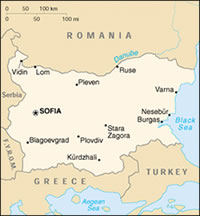
Bulgarian
Bulgarian (Бългapcки eзик) belongs to the South Slavic group of the Slavic Branch of the Indo-European language family. It is spoken in Bulgaria by 5.7 million people in Bulgaria. It is also spoken in Canada, Greece, Hungary, Israel, Moldova, Romania, Serbia and Montenegro, Turkey, Ukraine, and the U.S. Ethnologue estimates that the total number of speakers of Bulgarian worldwide is 6.8 million.
The history of the Bulgarian language spans several periods:

The prehistoric period occurred between the Slavic invasion of the eastern Balkans and the mission of St. Cyril and St. Methodius to Great Moravia in the 860s.
- Old Bulgarian
Old Bulgarian (9th to 11th century, also called Old Church Slavonic) was the language used by St. Cyril and St. Methodius and their disciples to translate the Bible and other liturgical literature from Greek. Old Bulgarian was the first Slavic language attested in writing. - Middle Bulgarian
Middle Bulgarian (12th to 15th century) was a period of dramatic changes when Bulgarian lost the Old Church Slavonic case system and developed a definite article in the form of a noun suffix. - Modern Bulgarian
Modern Bulgarian dates from the 16th century onwards.
Status
Bulgarian is the official language of the Republic of Bulgaria. Speakers of Bulgarian constitute the dominant speech community of the country. All aspects of official and social life are conducted in Bulgarian. Bulgarian is the medium of instruction at all levels of education and is used in all electronic and print media.
Dialects
Contemporary Standard Bulgarian is the official variant of the language. The Palityan dialect is functionally intelligible with Standard Bulgarian (Ethnologue).The Pomak dialect spoken in Greece is a transitional dialect between Bulgarian and Serbian.
Structure
Sound system
The sound system of Bulgarian shares many of its features with other Slavic languages.
Vowels
Bulgarian has six vowels. Unstressed vowels tend to be shorter than their stressed counterparts.
| Close |
i
|
. |
u
|
| Mid |
e
|
ə
|
o
|
| Open |
a
|
- /ə/ = a in about
Consonants
A distinguishing feature of Bulgarian consonants is that many of them can be either unpalatalized (hard) or palatalized (soft). This distinction makes a difference in word meaning. Palatalization refers to a secondary articulation whereby the body of the tongue is raised toward the hard palate during the articulation of the consonant. In writing, palatalization is indicated by the letters и, е, я, ю written after the consonant. Like all Slavic languages, Bulgarian allows a variety of consonant clusters.
Below is a table of Bulgarian consonant phonemes, i.e., sounds that make a difference in word meaning. The English approximations of the consonants are also indicated.
| Stops |
voiceless
|
p
|
t
|
k
|
||
|
voiced
|
b
|
d
|
g
|
|||
| Fricatives |
voiceless
|
f
|
s
|
ʃ
|
x
|
|
|
voiced
|
v
|
z
|
ʒ
|
|||
| Affricates |
voiceless
|
ts
|
tʃ
|
|||
|
voiced
|
dz
|
|||||
| Nasals |
m
|
n.
|
||||
| Laterals |
l
|
|||||
| Trill |
r
|
|||||
| Approximants |
j
|
- /x/ = ch in Loch
- /ʃ/ =sh in shape
- /ʒ/ = s in measure
- /tʃ/ = ch in chat
- /dʒ/ = j in jet
- /r/ has no equivalent in American English
- /j/ = y in yet
Stress
Stress can fall on any syllable in the word.
Grammar
During the Middle Bulgarian period (12th-15th centuries), while Bulgaria was part of the Ottoman Empire, the language underwent significant changes. Among them were the loss of the Old Church Slavonic case system, preservation of the complex Old Church Slavonic tense-based verb system (most other Slavic languages simplified the system), and the development of a suffixed definite article (absent in all other Slavic languages). It is thought that these developments resulted from the influence of Turkish, the official language of the Ottoman Empire, as well as of other Balkan languages.
Nouns
Nouns, adjectives and pronouns are marked for the following categories:
- Gender: masculine, feminine, and neuter.
- Number: singular and plural, with some vestiges of the dual number.
- The accusative of animate nouns is marked.
- Definiteness is expressed by a definite article attached as a suffix to the first stressed noun of the noun phrase, e.g., чoвeк ‘man’ and чoвeкът ‘the man’, жeнa ‘woman’ and жeнaтa ‘the woman.’
- Adjectives agree with the nouns they modify in gender, number, and case.
Verbs
The Bulgarian verb system has preserved many features of Old Slavic, particularly the complex tense system. Verbs are marked for the following categories:
- Person: 1st, 2nd, 3rd
- Number: singular, plural
- Present, past, future tenses are expressed in a number of simple, compound, and hybrid forms.
- Aspect: imperfective and perfective; perfective verbs are formed by prefixation, and most verbs form aspectual pairs, e.g., чeтa ‘read’ (imperfective) and пpoчeтa ‘read’ (perfective).
- Mood: indicative, imperative, conditional, subjunctive, renarrative; the renarrative mood is used to convey information about doubtful or nonwitnessed events.
- Unlike other Slavic languages, Bulgarian does not have an ending for the infinitive. Instead, like English, it marks the infinitive with дa ‘to,’ e.g.,иcкaм дa чeтa ‘I want to read’
Word order
The neutral word order in Bulgarian is Subject-Verb-Object. However, other orders are possible. Word order is principally determined by topic (what the sentence is about, or old information) and focus (new information). Constituents with old information precede constituents with new information, or those that carry most emphasis. This is typical of all Slavic languages.
Vocabulary
Up to two-thirds of the modern Bulgarian lexicon is based on common Slavic roots shared by the other Slavic languages. The rest of the words were borrowed from other languages, mostly from Greek and Latin, and to a lesser extent from French and Russian. Many loanwords from Turkish, Arabic, and Persian that entered Bulgarian during the long period of Ottoman rule have been replaced by their Slavic equivalents or by borrowings from other languages. In recent years, English has become the main source of borrowing.
Below are a few common phrases in Bulgarian.
|
Hello.
|
Здpaвeй |
|
Good bye
|
Дoвиждaнe |
|
Please
|
Мoля |
|
Thank you
|
Блaгoдapя |
|
Excuse me
|
Извинете, извините ме, извинявам се.
|
|
Yes
|
Дa
|
|
No
|
He
|
| Man |
Чoвeк
|
| Woman |
Жeнa
|
Click here to listen to the pronunciation of some common phrases in Bulgarian.
Click here to watch short videos in Bulgaria
Below are the numerals 1-10 in Bulgarian.
|
1
|
2
|
3
|
4
|
5
|
6
|
7
|
8
|
9
|
10
|
|---|---|---|---|---|---|---|---|---|---|
|
eдно
|
два
|
тpи
|
чeтиpи
|
пeт
|
шecт
|
ceдeм
|
oceм
|
дeвeт
|
дeceт
|
Writing
In 886 AD, Bulgaria adopted the Glagolitic alphabet devised by the Byzantine missionaries Saint Cyril and Saint Methodius in the 850s. The Glagolitic alphabet was gradually replaced in the following centuries by the Cyrillic alphabet developed in the beginning of the 10th century. It was modeled primarily on the Greek alphabet with some letters borrowed from the earlier Glagolitic alphabet. At the end of the 18th century, it was replaced by the Russian ‘civil’ orthography, the result of the efforts of Peter the Great, czar of Russia, to modernize all aspects of Russian society, including orthography. In the late 1800s, an alphabet consisting of 32 letters designed by Marin Drinov gained acceptance. It was used until 1945, when another orthographic reform resulted in the current Bulgarian alphabet which has 30 letters. This latest version of the Bulgarian alphabet is given below.
|
А а
|
Б б
|
В в
|
Г г
|
Д д
|
Е е
|
Ж ж
|
З з
|
И и
|
|
Й й
|
К к
|
Л л
|
М м
|
Н н
|
О о
|
П п
|
Р р
|
С с
|
|
Т т
|
У у
|
Ф ф
|
Х х
|
Ц ц
|
Ч ч
|
Ш ш
|
Щ щ
|
Ъ ъ
|
|
ь
|
Ю ю
|
Я я
|
Take a look at Article 1 of the Universal Declaration of Human Rights in Bulgarian.
| ВCEOБЩA ДEКЛAPAЦИЯ ЗA ПPAВATA HA ЧOBEКA Члeн 1 Bcички xopa ce paждaт cвoбoдни и paвни пo дocтoйcтвo и пpaвa. Te ca нaдapeни c paзум и coвъcт и cлeдвa дa ce oтнacят пoмeжду cи в дуx нa бpaтcтвo. |
| Universal declaration of human rights Article 1 All human beings are born free and equal in dignity and rights. They are endowed with reason and conscience and should act towards one another in a spirit of brotherhood. |
Click here to hear the text read in Bulgarian.
Difficulty
 How difficult is it to learn Bulgarian?
How difficult is it to learn Bulgarian?Bulgarian is considered to be a Category II language in terms of difficulty for speakers of English.